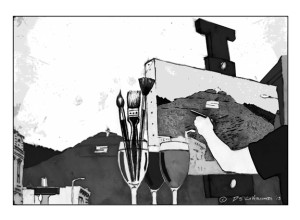By Martha Quillen
A few weeks ago, a customer at work started to leave, then came back. “Can I ask you a question?” she said, and suddenly she looked so upset, it made me nervous. I couldn’t imagine what sort of question would inspire her expression.
“I guess so,” I murmured, after an awkward pause.
“My husband is going to die soon and I was just wondering,” she hesitated as tears came to her eyes. “Do you ever feel joy again?”
The woman started to cry and I jumped up and hugged her. Joy? I thought. Have I ever felt joy? What is it exactly?
“I can’t stop crying,” she said.
“I know,” I whispered. “It’s hard, really hard. But I’ve gotten to where I don’t cry as much. And when I do cry, the tears are a relief; I feel so numb sometimes.”
I didn’t say much more, thank goodness – because I didn’t really have anything uplifting to offer. If I ever assumed that grief makes you sadder but wiser, I was wrong. Grief isn’t an intellectual experience; it doesn’t impart solutions. It doesn’t teach you how to cope, or help you find just the right words to comfort others.
Grief zaps your energy, inspires hopelessness, and diminishes your confidence. It makes you feel dull and useless. It incites anger and irritability. Yet I have come to regard grief as fitting, because it’s a person’s reaction to losing someone dear to them, and what is worse than losing a loved one?
Nothing.
Yet we live in a crazy world where violence isn’t just tolerated, it’s exalted. People resort to violence to express their rage against women, homosexuals, abortion, immigrants, gun control, Islamic fundamentalists, Iran, Syria, Israel and the U.S.
Death is hard enough to accept when it’s natural. But it strikes me as an abomination to coolly and dispassionately dispatch human beings for any reason – especially political reasons.
And when the innocent are targeted? Why would anyone kill schoolchildren? Or onlookers cheering a marathon? It’s obscene. Yet humans have been romanticizing killing for time immemorial. We’ve made folk heroes out of outlaws, gunmen, and even mafia dons.
In the 19th century, a British governor of New Zealand studied the Maori language, but he had trouble understanding the natives’ aggression — until he studied their mythology. Eventually experts started to examine myths and fables when studying a culture, and a theory was born: Mythologies serve as models for human behavior.
If that’s true, Americans may be in trouble. Our tales of minutemen, cowboys and Indians, gunfighters, dance hall girls and ladies of the evening tend to emphasize not just violence, but also lawlessness.
Yet America’s somewhat tarnished myths are pallid compared to some of our new stories. What sort of culture is obsessed with coroners and serial killers? Vampires, zombies, and werewolves? Wizards and sorcerers?
But perhaps the heroes don’t matter as much as who is telling the story. When told by a scout leader around a campfire, a well-told tale of daring-do may bolster the courage of a child afraid of the dark, whether it features a frontiersman or a wizard.
But such tales told in government chambers are dangerous because they are fairy tales that are (all too often) presented as facts – and not just boring, ordinary facts, either, but thrilling, inspirational facts.
Myth doesn’t muck up heroic epics with distasteful details – such as traumatic brain injuries, lost limbs, friendly fire, high casualties and civilian deaths. In mythology, the good guys prevail and the villains fail. Victors never loot or rape; combatants don’t make souvenirs out of body parts. Good Christians don’t execute old ladies because they think they serve Satan.
In the fairy-tale version, winners never turn on one another, and losers return home chastened and compliant. A stalwart marine doesn’t blow up the Oklahoma City Federal Building. The CIA-trained hero of Afghanistan doesn’t go on to knock down the World Trade Center towers. And humiliated losers don’t turn into Jihadists, neo-Nazis or white supremacists.
Wars, as armchair revolutionaries promote them, entail plenty of blood, guts and gore, but when the cause is just, the righteous win. Glorious victories insure freedom, liberty and equality; and impoverished, war-torn countries (such as Iraq and Afghanistan) never fall prey to societal breakdown, civil war, economic disaster, starvation, or violent takeover by thugs, criminals or extremists.
But after real wars, hatred often mounts and hostilities endure. The defeated often reunite to plot vengeance, and would-be insurgents amass weapons.
In the real world, murder begets murder and war begets war. But don’t take my word on that. Consider history.
The imperial government of Germany collapsed after WWI, and the Germans voted in a new democratic Republic. But the terms of the Armistice were harsh. In 1921 the allies presented Germany with a 33 billion dollar bill for war damages.
The new Republic asked for a postponement, but France showed no mercy; it seized the industrial region of Germany known as the Ruhr, and Germany’s currency tanked. Hyperinflation resulted, and by the autumn of 1923, it took billions of dollars just to buy a bag of groceries in Germany. People’s paychecks were worthless, their savings were lost and hunger riots resulted.
The new Republic eventually managed to renegotiate the terms of the peace, and a level of prosperity returned. But the Germans didn’t forget what it was like to starve, and when a worldwide economic catastrophe struck in 1929, the Nazi Party quickly rose to power by promising to reunite the German people and restore Germany’s greatness. We all know the rest of that story. But WWII was just the beginning.
After the war, the Soviets latched on to former German holdings, and France, Britain and the U.S. started fighting communism around the globe.
The postwar rise of Israel was inspirational, but Islamic countries saw the new Jewish homeland as an invasion and a threat – and numerous new wars resulted.
Eventually the countries swallowed by the Soviets rallied and launched a number of triumphant revolutions; but crime, corruption and inept leadership crushed a lot of their exuberance – and some countries, such as Yugoslavia, fell prey to the revival of old enmities. And the killing went on. And on. And on.
How people ever came to believe that war could or would bring about the cessation of aggression and hostility is a mystery to me. After losing a spouse, I can’t imagine how anyone could believe that people would just forgive and forget the intentional destruction of their homes and families.
That isn’t how humans think. People enshrine their pasts in legends, histories and holy books and thereby hold on to grudges for generations. Christians and Jews still recount the nefarious deeds of Pharaoh, and Arabs still “remember” the crusades. Given our history, it seems unlikely that we will ever eliminate murder or war entirely.
But perhaps new narratives could help reduce the carnage. And new narratives are continuously evolving out of old legends. Take vampires, for example. Today’s vampires are nothing like Victorian vampires. Modern vampires eschew bloodletting and want to marry good, wholesome girls.
Modern wizards decry black magic and fight evil. Modern dragons are often just overgrown pets, and modern heroes tend to be pathologists rather than gunmen.
Some modern allegories even feature peacekeepers rather than warriors. Furry-footed little Hobbits have long thrived by resisting power and violence. And Star Trek crews have been serving a universal government dedicated to preserving peace and democracy for almost five decades now.
Slowly but surely, our mythologies are trending toward peace and diplomacy, even if we aren’t. And if the theorists are right, our new, kinder, gentler myths may eventually make a difference, which strikes me as a good thing – perhaps even a joyous thing.
Now I remember what joy is: it’s that ebullient emotion a person experiences when everything seems right in his or her world. Clearly grief can squelch joy for a time. But it’s romantic notions about murder, power and vengeance that can plunge entire societies into mourning.
Ed Quillen died on June 3, 2012, one year ago this month. Life goes on for his wife, but it isn’t nearly as fine or funny without him.




